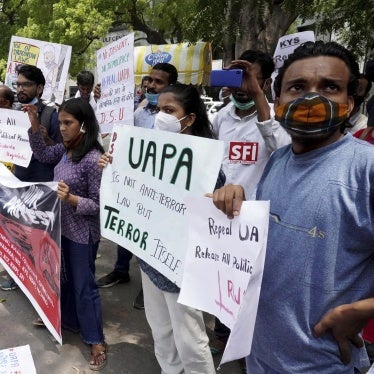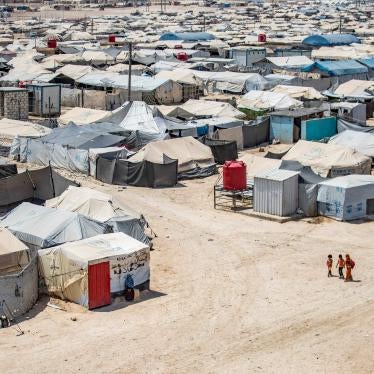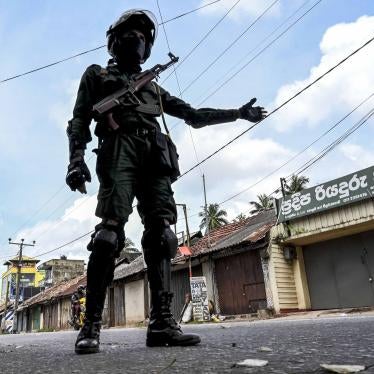(New York) - Ten years after a grisly grenade attack on an opposition party rally in Phnom Penh left at least 16 dead and more than 150 injured, the Cambodian government has made no progress in bringing the perpetrators to justice, Human Rights Watch said today.
Human Rights Watch urged the US Federal Bureau of Investigation (FBI) to reopen its investigation of the attack, which the US government deemed an “act of terrorism.”
On March 30, 1997, a crowd of approximately 200 supporters of the opposition Khmer Nation Party (KNP), led by former Finance Minister Sam Rainsy, gathered in a park across the street from the National Assembly to denounce the judiciary’s lack of independence and judicial corruption. In a well-planned attack, four grenades were thrown into the crowd, killing protestors and bystanders, including children, and blowing limbs off street vendors.
After the first grenade exploded, Rainsy’s bodyguard, Han Muny, threw himself on top of his leader. He took the full force of a subsequent grenade and died at the scene. Rainsy escaped with a minor leg injury.
“The Cambodian authorities have never conducted a serious investigation into this attack, either despite or because of substantial evidence of government involvement,” said Brad Adams, Asia director at Human Rights Watch. “This attack was intended to destroy serious political pluralism in Cambodia, and it partially succeeded. Politics in Cambodia has never fully recovered.”
On the day of the attack, for the first time co-Prime Minister Hun Sen’s personal bodyguard unit was deployed at a demonstration. Photographs show them there in full riot gear. The police force, which had previously maintained a high-profile presence at opposition demonstrations in an effort to discourage public participation, had an unusually low profile on this day, grouped around the corner from the park. Other police units, however, were in a nearby police station in full riot gear on high alert.
Also for the first time, the KNP had received official permission from both the Ministry of the Interior and the Phnom Penh municipality to hold a demonstration, fuelling speculation that the demonstration was authorized so it could be attacked.
Numerous witnesses reported that the people who had thrown the grenades subsequently ran toward Hun Sen’s bodyguards, who were deployed in a line at the west end of the park in front of a closed and guarded residential compound containing the homes of many senior Cambodian People’s Party (CPP) leaders. Witnesses told investigators from the United Nations and the FBI that the bodyguards opened the line to allow the grenade-throwers to pass into the compound, and that members of the crowd pursuing the grenade-throwers were stopped at gunpoint and threatened with being shot if they did not retreat.
In a June 1997 interview with the Phnom Penh Post, Hing Bun Heang, deputy commander of Hun Sen’s bodyguard unit, threatened to kill journalists who alleged that Hun Sen’s bodyguards were involved.
“The authorities have never offered a credible explanation for the deployment or behavior of Hun Sen’s bodyguards,” said Adams. “The actions speak for themselves, and may reach the highest levels of the Cambodian government.”
Instead of launching a serious investigation, Hun Sen immediately called for the arrest of the demonstration’s organizers and instructed police not to allow them to leave the country. (To read an Agence France Presse account published at the time, please see https://www.hrw.org/english/docs/2006/03/28/cambod13086.htm.)
The attack took place at a time of extreme political tension. The coalition government between the royalist FUNCINPEC and Hun Sen’s CPP was unraveling after armed clashes in Battambang province the previous month. Rainsy’s KNP was seen as a threat in national elections scheduled for the following year. For more than a year, he and his party members had been the subject of attacks and threats from CPP officials and agents. A bloody coup by Hun Sen’s forces followed in July 1997, killing more than 100 and sending politicians and activists into exile in fear for their lives.
“This brazen attack carried out in broad daylight ingrained impunity in Cambodia more than any other single act in the country’s recent history,” said Adams. “A few months later, Hun Sen’s coup cemented his hold on power.”
At the time, the grenade attack made headlines and provoked outrage around the world. The Washington Post dispatched one of its senior investigative reporters to Phnom Penh. On June 29, 1997, R. Jeffrey Smith wrote:
-
In a classified report that could pose some awkward problems for US policymakers, the FBI tentatively has pinned responsibility for the blasts, and the subsequent interference, on personal bodyguard forces employed by Hun Sen, one of Cambodia’s two prime ministers, according to four US government sources familiar with its contents. The preliminary report was based on a two-month investigation by FBI agents sent here under a federal law giving the bureau jurisdiction whenever a US citizen is injured by terrorism ... The bureau says its investigation is continuing, but the agents involved reportedly have complained that additional informants here are too frightened to come forward.
The FBI investigated the attack because Ron Abney, a US citizen, was seriously injured in the blast. Abney had to be evacuated to Singapore to treat shrapnel wounds in his hip.
While the investigation made a promising start, the Cambodian authorities failed to cooperate sufficiently and it soon wound down. Although on January 9, 2000, CIA director George Tenet said the United States would never forget an act of terrorism against its citizens and would bring those responsible to justice “no matter how long it takes,” this investigation has effectively been abandoned.
“The FBI launched the only investigation into the attack, but the US has inexplicably dropped it,” said Adams. “Intentional amnesia has since set in, and no government or donor now says a word about the attack.”
In March 2006, the FBI awarded a medal to the Cambodian Chief of National Police, Hok Lundy, for his support of the US global campaign against terrorism. Hok Lundy was chief of the national police at the time of the grenade attack and has long been linked to political violence.
“Instead of awarding medals to known human rights abusers, the US government should insist that the FBI return to complete its investigation,” said Adams. “Family members of the victims are still waiting for justice.”








